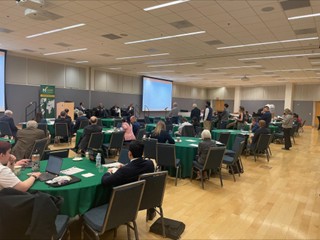7th Annual Mason Energy Forum Highlights Clean Energy Needs for AI Transitions
By: Hannah Townley and Ambassador (ret.) Richard D. Kauzlarich
The GMU Center for Energy and Science Policy’s Annual Energy Forum has a clear takeaway: the AI revolution cannot succeed without a parallel clean energy transition. As students of public policy, global commerce, and security engaged with speakers from industry, academia, and government, the day made it evident that the future of AI—and our digital infrastructure more broadly—depends on a resilient, sustainable power system.
The leaders repeatedly emphasized how the AI economy and its subsequent pressures are a key local issue here in Northern Virginia, which now carries over half the world’s internet traffic. Discussions about grid stress, capacity shortages, and the limits of current infrastructure made it clear that simply building more is not enough, if the local economy is not willing to invest in the sustainable, scalable systems of clean energy.
Panelists highlighted the potential of nuclear power, especially small modular reactors, to meet long-term baseload needs, while renewables and energy storage were positioned as essential medium-term strategies. Also discussed was how AI itself offers powerful tools to optimize energy systems—improving grid efficiency, enhancing predictive maintenance, and managing emissions. However, AI’s growing footprint also demands more power, adding urgency to the clean energy transition.
One major theme that resonated with our students was the critical need for strategic investment in transmission, workforce development, and regulatory innovation. George Mason University’s efforts to build interdisciplinary programs—combining AI, sustainable infrastructure, and microgrids—show that education must evolve alongside industry demands.
That sense of interconnectedness drove many of the day’s conversations. Clean energy isn’t just a climate imperative; it’s foundational for the continued growth of technologies like AI that promise to transform our economy. Without sustainable, reliable power, we risk stalling innovation at a time when global leadership in AI and energy is more competitive than ever.
Although the challenges are daunting, collaboration across sectors, forward-looking policies, and a strong clean energy foundation can power both the AI transition and a more resilient future.
(Special thanks to the PW Perspective’s Zayd Hamid for his contributions on this article.)



